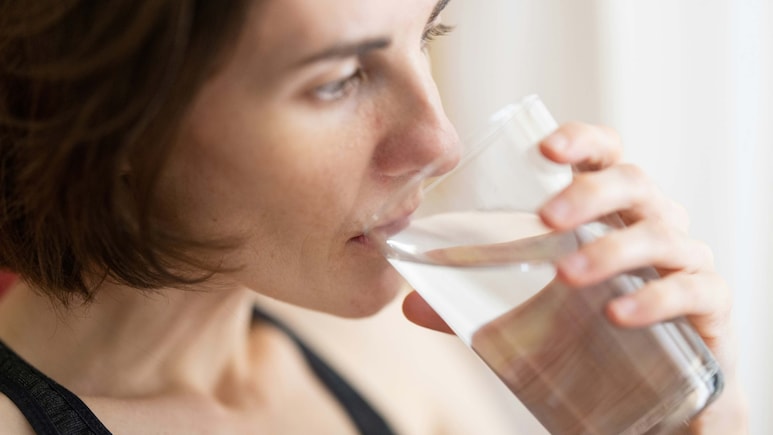
Stress has become a default state for most of us, whether it's juggling deadlines, endless notifications, or simply trying to keep up with life's daily grind. And while there's no shortage of advice on how to "stay calm" or "manage stress": from deep breathing to digital detoxes, most of it feels either unrealistic or short-lived. But what if something as simple as drinking more water could actually help?
Recent research suggests that hydration might play a bigger role in managing stress than most people realise.
Let's break it down.
How Stress Affects Our Body
Stress triggers a chain of reactions in your body, releasing hormones like cortisol and adrenaline. These are helpful in short bursts, they sharpen your senses and prepare you for action, but when stress becomes chronic, your body stays in overdrive. The result? Headaches, fatigue, irritability, poor concentration, and even digestive problems.

Your body produces cortisol and adrenaline when you're stressed. Photo: Unsplash
But that's not all: A quick search online showed us that since stress activates the body's fight-or-flight systems, releasing adrenaline and cortisol that raise heart rate, blood pressure, and blood sugar to meet immediate demands; when this persists, it can contribute to hypertension, atherosclerosis, and higher cardiovascular risk, disrupt digestion with reflux, nausea, diarrhea or constipation, tense muscles leading to headaches and body pain, suppress immune defenses so infections and healing worsen, and alter endocrine and metabolic balance in ways that promote insulin resistance and weight changes; at the same time, it affects brain and mood with anxiety, irritability, low motivation, concentration and memory problems, and sleep disruption, and it can reduce libido, contribute to erectile dysfunction, and cause menstrual irregularities (phew).
But can drinking more water solve all these problems? Let try to find out.
Dehydration can amplify these symptoms. When you don't drink enough water, your body perceives it as a form of stress, which can further raise cortisol levels, the very hormone you're trying to control.
The Hydration - Stress Connection
Several peer-reviewed studies over the last decade have found consistent links between hydration status and stress reactivity. In simple terms: the less water you drink, the more your body overreacts to stress.

When you don't drink enough water, your body perceives it as a form of stress. Photo: Unsplash
A 2025 study from Liverpool John Moores University, published in the Journal of Applied Physiology, examined adults with varying daily water intakes. Those who habitually drank less water showed significantly greater increases in salivary cortisol during a psychosocial stress test compared to those who were well-hydrated. Interestingly, both groups reported similar levels of anxiety, suggesting that the stress difference wasn't psychological, it was biological.
In other words, your brain might feel equally anxious in both cases, but your body's physiological response (via stress hormones) is far higher when you're under-hydrated.
What Is The Science Saying
Hydration's effect on mood and stress isn't exactly new, but newer studies have provided stronger evidence.
In 2014, researchers studied the mood of "high drinkers" (who consumed about 2.5 litres per day) and "low drinkers" (who drank less than 1.2 litres). When low drinkers increased their water intake to 2.5 litres, they experienced fewer feelings of fatigue and confusion. Conversely, when high drinkers were asked to cut down, their calmness and contentedness took a dip.
Similarly, a 2012 study in the British Journal of Nutrition found that just 24 hours of fluid restriction led to increased tension, tiredness, and difficulty concentrating. Even mild dehydration was enough to throw off mood and alertness : two states closely tied to stress perception.
And it's not just about mood. Findings from the Uconn Human Performance Laboratory in 2012 showed that mild dehydration, just a 1 to 2% drop in body water, could lead to headaches, lower energy, and poorer focus. These are precisely the symptoms people associate with being "stressed out".
How Water Influences Cortisol
Cortisol, often called the "stress hormone", plays a key role in how our body reacts to challenges. While short bursts of cortisol help us handle immediate stress, constant elevations can disrupt sleep, metabolism, and immunity.
A 2025 prospective study on hydration and cortisol dynamics reinforced this connection. The researchers found that lower hydration correlated with higher cortisol responses. This means dehydration doesn't just make you feel stressed, it actually makes your stress hormones spike higher than they should.
Can Water Really Calm You Down
Hydration alone won't erase stress. It's not a magic solution to life's challenges. But these studies suggest that being adequately hydrated can reduce the impact of stress, essentially, it helps your body cope better.
When your cells are hydrated, your brain works more efficiently, your mood stabilises, and your body's hormonal balance remains steady. On the other hand, even slight dehydration can impair decision-making and increase perceived effort, making daily stressors feel heavier than they are.
Experts suggest aiming for around 2.5 to 3 litres of water daily (not in excess, as that is also harmful to health), depending on your activity level, climate, and diet. Foods rich in water, like fruits, vegetables, and soups, also contribute to hydration.
BRB, going to finish my water bottle...
Track Latest News Live on NDTV.com and get news updates from India and around the world

